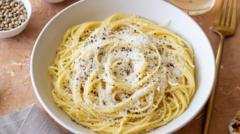Italians have reacted vehemently to a recent recipe for cacio e pepe published on the Good Food website, as it appears to distort the traditional ingredients of this iconic Roman dish. The outrage erupted after Good Food listed four ingredients – spaghetti, black pepper, parmesan, and butter – with the controversial suggestion of including double cream, when in fact, the authentic recipe consists solely of spaghetti, black pepper, and pecorino cheese.
The recipe's portrayal as a quick lunchtime solution was met with derision from Italian food purists, leading the Italian Federation of Associations of Chefs and Pizza Makers to raise formal complaints with the British embassy in Rome. Claudio Pica, the president of the federation, expressed disbelief at Good Food’s deviation from the traditional recipe, asserting that the very essence of cacio e pepe is being diluted. Historical significance and culinary pride underscored the angry reactions, with many Italians asserting that such mishandling of revered dishes directly insults their national heritage.
This culinary controversy has permeated Italian media, with one public broadcaster's journalist commenting on the peculiar irony of a British entity undermining Italian culinary excellence. Local chefs, such as Giorgio Eramo, who runs a fresh pasta restaurant near the Vatican, stressed that substituting butter and parmesan in cacio e pepe transformed the dish into "pasta Alfredo" – a distinctly different recipe altogether.
Maurizio and Loredana, who manage a four-generation family-owned hotel in Rome, emphasized that variations can be permissible, but the core recipe must be defended against unwanted alterations. They, alongside many others, pointed out the importance of honoring culinary tradition, underscoring the significance of provenance and original ingredients.
The indignation extends beyond just this single recipe; Italians frequently react against perceived foreign improprieties in their cuisine, such as pizzas garnished with pineapple or improperly timed cappuccinos. Café worker Eleonora acknowledged the emotional responses tied to Italian cuisine, suggesting that for many, food is an integral part of their cultural identity.
In this case, the response to the Good Food recipe reflects a broader sentiment regarding the safeguarding of traditional culinary practices against modern interpretations that obscure their authenticity. Immediate Media, the parent company of Good Food, has yet to respond publicly to the backlash, but the culinary discourse around this incident is sure to resonate within Italy and beyond for some time.



















